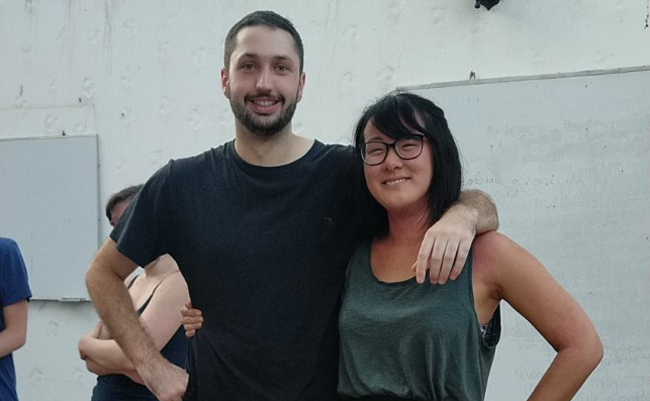Friday 8 May 2020 9:20am
Shamus Moffatt and Connie Wan, two of the University of Otago’s Medical Trainee Interns could never have predicted how their planned three-month elective in Trujillo, Peru, was going to end. After an anxious time spent in lockdown with their Peruvian host families, the pair are now home safely. The describe their experiences in this opinion piece written for the Otago Bulletin Board.

Trainee Interns Shamus Moffatt and Connie Wan pose for a photo early in their elective - before the impact of COVID-19 became apparent.
At the beginning of our elective in late February, the reality of COVID-19 was yet to unfold; international travel was still permitted, and we had the go-ahead from the university to proceed with our electives. We intended on completing a two-week course of intensive medical Spanish followed by four weeks of immersive clinical hospital experience. We stayed with Peruvian host families to familiarise ourselves with the language as quickly as possible before integrating our Spanish into real-world clinical practice. While initially daunting, it quickly became appreciated considering the pre-elective level of Spanish for one of us was that of downloading Duolingo (an online language learning app) on the plane ride over. We had planned our electives independently, and being based at different campuses in New Zealand (Wellington and Dunedin) we had no idea we would run into each other. Our coincidental meeting turned out to be quite fortuitous, considering what was to come.
"Only nine days after the first case of coronavirus was confirmed in Peru, a 15-day country-wide lockdown was enforced with all travel banned."
The day before the start of clinical rotations, while celebrating the end of our intensive language programme, the news of lockdown broke. Only nine days after the first case of coronavirus was confirmed in Peru, a 15-day country-wide lockdown was enforced with all travel banned. With cases yet to reach our region, it was a few days until the impact of the reality hit. The following day, all our classes were cancelled. As students, we did not count as essential service workers and therefore were also not allowed to participate in our rotations as planned. Timetables now on-hold, we were bound to strict quarantine until further notice. Still yet to realise the reality and magnitude of the global situation, the first few days proved an enjoyable and somewhat exciting novelty. In lieu of seven-hour language classes and eight-hour hospital shifts, we had the fortune of getting to know our generous host families with whom our Spanish improved rapidly as a welcome result.
Novelty turned into anxiety as quarantine continued; days began to merge and a nightly curfew of 8pm to 6am was instated. Students from other countries were preparing for repatriation flights home while we two Kiwis were yet to hear any news. Three weeks into quarantine, the restrictions were tightened. It was announced that a gender-based segregation system would be implemented in order to further restrict movement: only men were allowed to leave the house (for essentials only) on Mondays, Wednesdays, and Fridays, and women could only leave on Tuesdays, Thursdays, and Saturdays. Needless to say, the situation had become more akin to a life of 1920 than 2020. There was a running joke that on the women’s days, the women would be returning all the incorrect items the men had bought on the preceding days! Furthermore, our region (La Libertad) was deemed a “naughty region” by the Peruvian Government and had its own further restrictions implemented. We were now only allowed to leave the house between the hours of 5am and 4pm. To us Kiwis, there was a frighteningly large police and military presence on the streets enforcing the quarantine rules; trucks full of armed military personnel and parades of police on motorcycles patrolled otherwise quiet suburbs. As foreigners, it was difficult not to feel self-aware and scrutinised, and the high security measures ironically were not particularly comforting.
"While our elective was not the experience we initially planned it to be, it was certainly unique and no less valuable."
With uncertainty and discomfort intensifying, we were hopeful when the Embassy informed us of a private Australian charter flight intending to repatriate Australian, British, and New Zealand citizens. Unfortunately, due to inland travel restrictions it was apparent that this would not be an option for us: there was no way for us to get to Lima at this point. We continued in a state of limbo, days occupied with worry from our loved ones, guilt as students unable to fulfil our intended role, all the while feeling like an increased burden to our host families having to house us in an already stressful situation. It was an incredibly difficult waiting game with no choice but to put our lives on hold and wait. There was persistent messaging coming from the Embassy to hunker down and prepare for the long haul. We were doing all we could in a situation becoming increasingly out of our control. When we finally received a message stating that a travel company in New Zealand had arranged a repatriation flight, we were sceptical. There was no guarantee the flight would proceed, though we had little other choice; we had been idle in Peru for close to four weeks and we still had to resume our medical education and graduate on time. We booked the ticket which included a rickety nine-hour bus ride to Lima and two days later, taking off from Peru’s capital city, we were finally homebound.
Reflecting on our time abroad, it is interesting what we can learn and gain when required to slow down and take a pause. While our elective was not the experience we initially planned it to be, it was certainly unique and no less valuable. We are grateful to be safely home, with some interesting although unexpected stories, new friends, memorable experiences, and a new appreciation for medicine, the world, and the comforts and fortunes of home.
